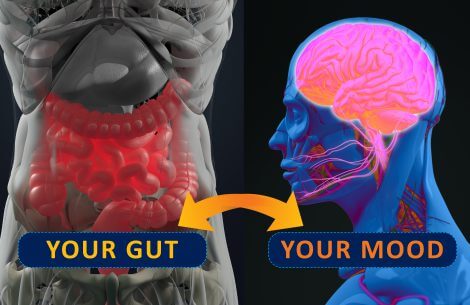Relatively speaking, the gut and brain are quite a distance from one another physically. However, research shows pathologically the brain and gut are very close: They are interconnected and impact each other – the gut: the second brain. Think about eating and your stomach responds with gurgles and growls. The reason is that the thought of eating causes the release of gastric juice.
Would it surprise you to know you have a second brain? Within the walls of your stomach are more than a 100 million nerve cells lining the gastrointestinal tract in two layers. The second little brain (enteric nervous system – ENS) is a recent discovery with many implications. No, it can’t write the great American novel for you or order a skinny latte.
What it does is control digestion, its primary job. And it communicates back and forth with the big brain. For example, it was believed that anxiety and depression contributed to irritable bowel syndrome (IBS) and other intestinal conditions. But, research into the working of the ENS, shows it may be the other way around. Irritation in the gastrointestinal system signals the brain which affects mood.
Also, some people with functional digestive conditions have an acute reaction to pain. Their sensitivity to pain, research suggests, is due to their brains being more responsive to pain signals from the GI tract. The brain-gut condition may explain many diseases that were once thought to be in the “patient’s head.”
“‘For decades, researchers and doctors thought that anxiety and depression contributed to these problems [Intestinal]. But our studies and others show that it may also be the other way around….'” Jay Pasricha, M.D. John Hopkins Director of Neurogastroenterology[1]
Because the two brains communicate with one another therapies that help one may help the other. Research shows that treatments that reduce stress also improved digestive issues. Therapies like meditation, massages, cognitive behavioral therapy and hypnotherapy that are known to engage the parasympathetic nervous system (rest and relaxation) may also help improve gastrointestinal diseases.
Beyond the connection between ENS and digestion, the “dialogue” between the two explains other common body reactions. It’s the reason for having “butterflies” or nausea before a public performance or even giving a work presentation. The anxious brain sends a signal to the stomach in the absence of any medical cause.
Researchers at Johns Hopkins University also believe the digestive system may affect cognition and memory. They are researching how the connection between nerve signals and the stomach’s hormones and microbiome affects metabolism. Findings may help prevent metabolic conditions like diabetes.
Because of the enthusiasm for the gut-brain connection, there is ongoing research with new discoveries. For example, studies show that one of the ways the gut and brain interact is through the stomach’s microbiome (gut bacteria). Through the vagus nerve in the stomach, microbiome release neurotransmitters that “speak” with the brain.
“‘These new findings may explain why a higher-than-normal percentage of people with IBS and functional bowel problems develop depression and anxiety…. That’s important because up to 30 to 40 percent of the population has functional bowel problems at some point.'” Jay Pasrich, M.D. John Hopkins Director of Neurogastroenterology[2]
These findings have led to the suggestion that including probiotics in the diet may improve the interaction between the gut and the brain. One study showed a reduction in anxiety when Lactobacillus helveticus and B. longum were given to the study’s participants.
This association between the gut and brain is in line with the philosophy of the mind-body connection behind Complementary and Integrative medicine. Naturopathic medicine, Traditional Chinese Medicine, and Ayurveda all have their basis in this. Western medicine is now helping to explain the mechanics of these associations. It’s a win-win that benefits all of us.
References:
- Deans, Emily M.D. The Gut-Brain Connection, Mental Illness, and Disease (April 06, 2014). Retrieved from https://www.psychologytoday.com/us/blog/evolutionary-psychiatry/201404/the-gut-brain-connection-mental-illness-and-disease.
- Julson, Erica, MS, RDN, CLT. 9 Health Benefits of Lion’s Mane Mushroom (Plus Side Effects). May 19, 2018. Retrieved from https://www.healthline.com/nutrition/lions-mane-mushroom#section3.
- The Brain-Gut Connection. Retrieved from https://www.hopkinsmedicine.org/health/healthy_aging/healthy_body/the-brain-gut-connection.
- The Gut-Brain Connection. Retrieved from https://www.health.harvard.edu/diseases-and-conditions/the-gut-brain-connection.
- Johns Hopkins University, The Brain-Gut Connection. Web.

